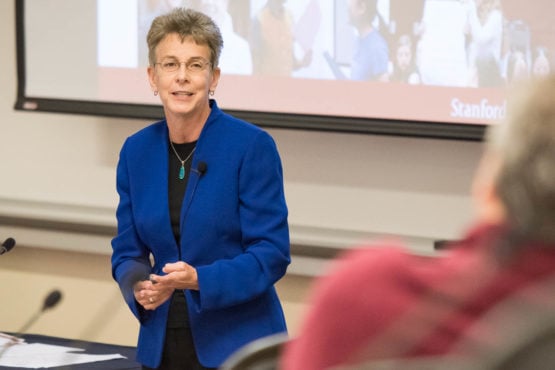In its Thursday meeting, which focused almost solely on graduate student issues, the Faculty Senate voted to allow individual Stanford graduate schools to choose whether they require the Graduate Record Examination (GRE) as a factor for determining admission.
Currently, Stanford’s Graduate Academic Policies and Procedures state that all graduate applicants, excluding those for certain professional programs, must submit a GRE General Test score to be considered for admission. With the new policy, deans will be able to establish a policy for their respective school or allow individual departments within the school to decide.
The change was recommended by the Committee on Graduate Studies — nested within the Faculty Senate’s Academic Council — following a suggestion from the School of Medicine, as well as from deans of Engineering and Humanities & Sciences. Decentralizing the GRE requirement policy is meant to avoid dissuading students from applying to Stanford in favor of other universities that do not require the test.
Following an annual report on graduate student issues delivered by Vice Provost for Graduate Education Patricia Gumport M.A. ’82 M.A. ’86 Ph.D. ’87, the Senate approved two new policies that aim to strengthen graduate advising.
The first policy change requires that academic departments each develop and articulate explicit minimum expectations for both advisors and advisees. The expectations can be altered by faculty, as long they as they still comply with departmental policy.
The second policy change requires that a doctoral student’s principal dissertation advisor be a Stanford affiliate, ending current policies under which former faculty members can remain principal advisors to Ph.D. candidates after departing from Stanford. Under the new policy, former faculty members can only act as co-advisors alongside current faculty.
The changes to advising practices come after a year-long review of graduate student advising; issues with advising were detailed in Gumport’s annual report. She cited survey data from exiting Ph.D. students, which revealed that 40 percent of participants felt that “availability of faculty” was an obstacle to their academic progress. Twenty-seven percent said the same was true of “advising.”
David Goldhaber-Gordon, Committee on Graduate Studies chair and physics professor, is hopeful the new policies will help remedy these issues.
“Advising is, along with teaching and research, one of the most impactful things we do here,” Goldhaber-Gordon said. “We hope this will spur conversations among faculty, and between faculty and students, about how the advising relationship works.”
Other topics discussed at Thursday’s meeting included the growth of graduate applications and yield rate — Gumport cited a 23 percent increase in total graduate enrollment over the last 15 years — putting increased pressure on centralized resources, including on-campus housing.
An expansion of East campus graduate housing, which will add about 2,500 beds to Stanford’s on-campus residential offerings, is scheduled to finish in the fall of 2020.
Additionally, Gumport said that the proportion of minority students on campus has not dramatically grown over the years.
After the meeting, Provost Persis Drell said that she is in the process of establishing a committee to advise her on the future of the Office of the Vice Provost for Teaching and Learning, following John Mitchell’s departure from his position as vice provost. The committee will be chaired by Physics Professor Patricia Burchat and Tom Kenny, mechanical engineering professor and senior associate dean for Student Affairs in the School of Engineering.
Drell also addressed concerns regarding the lack of diversity at a recent academic conference at the Hoover Institution featuring 30 white, male speakers. Drell emphasized the value she sees in diverse perspectives, calling the controversial conference a “learning experience.” She noted that the conference organizer, Professor Niall Ferguson, has apologized for the speaker lineup.
The next Faculty Senate meeting will take place on April 26.
Contact Julia Ingram at jmingram ‘at’ stanford.edu
